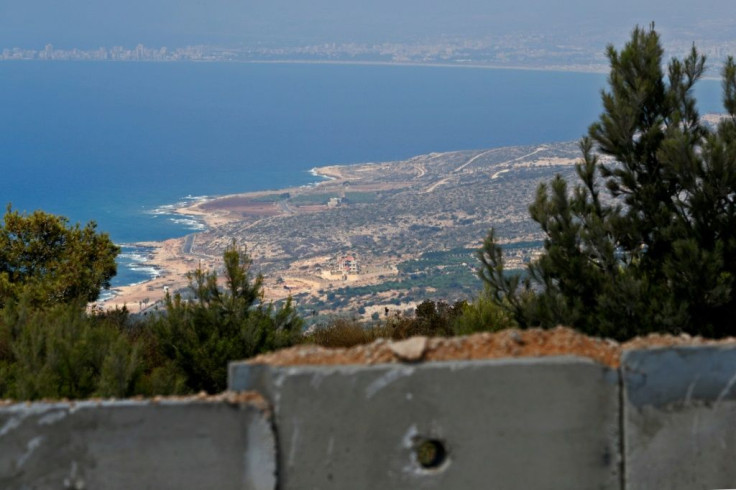Lebanon, Israel Announce Talks On Disputed Maritime Border
Lebanon and Israel said Thursday they will hold US-brokered negotiations on their disputed maritime border, in what Washington hailed as a "historic" agreement between two sides technically still at war.
The issue of the sea frontier is particularly sensitive, as Lebanon wants to drill for hydrocarbons in a part of the Mediterranean disputed by Israel.
The United States will act as a facilitator during the talks to be held a the UN peacekeeping headquarters in the southern Lebanon border town of Naqoura, Lebanon's Parliament Speaker Nabih Berri told a news conference in Beirut, without giving a date.
US envoy David Schenker said a tentative date for the discussions had been set for October 14, but would be confirmed.
In Israel, Energy Minister Youval Steinitz said in a statement that there would be "direct negotiations".
But an adviser to Berri, Ali Hamdan, said the talks would be "indirect".
"They will sit in the same room, but there will be no direct conversation between both sides. It will rather be via the UN team," he told AFP.
He said the last US-backed talks between both sides were held in 1983, when they signed a peace deal that quickly became obsolete.
US Secretary of State Mike Pompeo welcomed what he called a "historic" agreement between the two countries to discuss their disputed borders, a "result of nearly three years of intense diplomatic engagement".
In a statement, UN Secretary General Antonio Guterres said he "welcomes" the agreement, adding that talks will be held "at the premises of the UN Interim Force in Lebanon (UNIFIL) in Naqoura," southern Lebanon.
The UN "will remain fully committed to supporting the process as requested by the parties and within its capacity and mandate," he added.
Berri said a framework agreement had been reached to start the negotiations, and read out a September 22 copy of it.
The United States was asked "by both sides, Israel and Lebanon, to act as a mediator and facilitator to draw up the maritime border, and it is ready to do this," he quoted the agreement as saying.
"The US representatives and the UN special coordinator for Lebanon are prepared to provide meeting minutes together that they will sign and present to Israel and Lebanon to sign at the end of each meeting," Berri added.

The text Berri read also mentioned seeking an agreement on the land border, where both sides dispute several areas along the Blue Line, a UN-drawn frontier established in 2000 after Israeli troops withdrew from southern Lebanon.
But Schenker said this talks track would however be held separately from the maritime border discussions.
"We welcome... new steps by the parties to resume expert-level discussion on remaining unresolved Blue Line points with the objective also of reaching agreement on that," he said.
But "that's a separate track and that obviously is a discussion traditionally between the Israelis, the Lebanese, and UNIFIL," he said, referring to the UN mission in Lebanon.
The UN Special Coordinator for Lebanon, Jan Kubis, hailed what he described as "important positive news, confirming the decision of Lebanon and Israel to begin discussions on the delineation of the maritime boundary... with the US participating as mediator and facilitator."
"A different set of discussions on (the) Blue line will take place as well," he added.
UNIFIL said it welcomed the announcement of "a framework agreement to launch negotiations between Lebanon and Israel on maritime and land boundary demarcation between the two countries".
Israel's Foreign Minister Gabi Ashkenazi thanked Pompeo and his staff, and said he believed success in talks would "contribute to the stability of the region".
Lebanon's president, Michel Aoun, welcomed the framework agreement.
In February 2018, Lebanon signed its first contract for offshore drilling for oil and gas in two blocks in the Mediterranean with a consortium comprising energy giants Total, ENI and Novatek.
Lebanon in April said initial drilling in Block 4 had shown traces of gas but no commercially viable reserves.
Exploration of the other, Block 9, has not started and is more controversial as ownership is disputed by Israel.
Lebanese energy expert Laury Haytayan said both sides agreeing on the maritime frontier was in Lebanon's interest so it could press forward with oil and gas exploration off its coast.
The maritime "border demarcation is necessary because first it will facilitate work on Block 9, and could also spark interest from international firms for Block 8, more than half of which lies in the disputed area," she said.
Israel and Lebanon's Shiite movement Hezbollah fought a devastating war in 2006.
© Copyright AFP 2024. All rights reserved.











